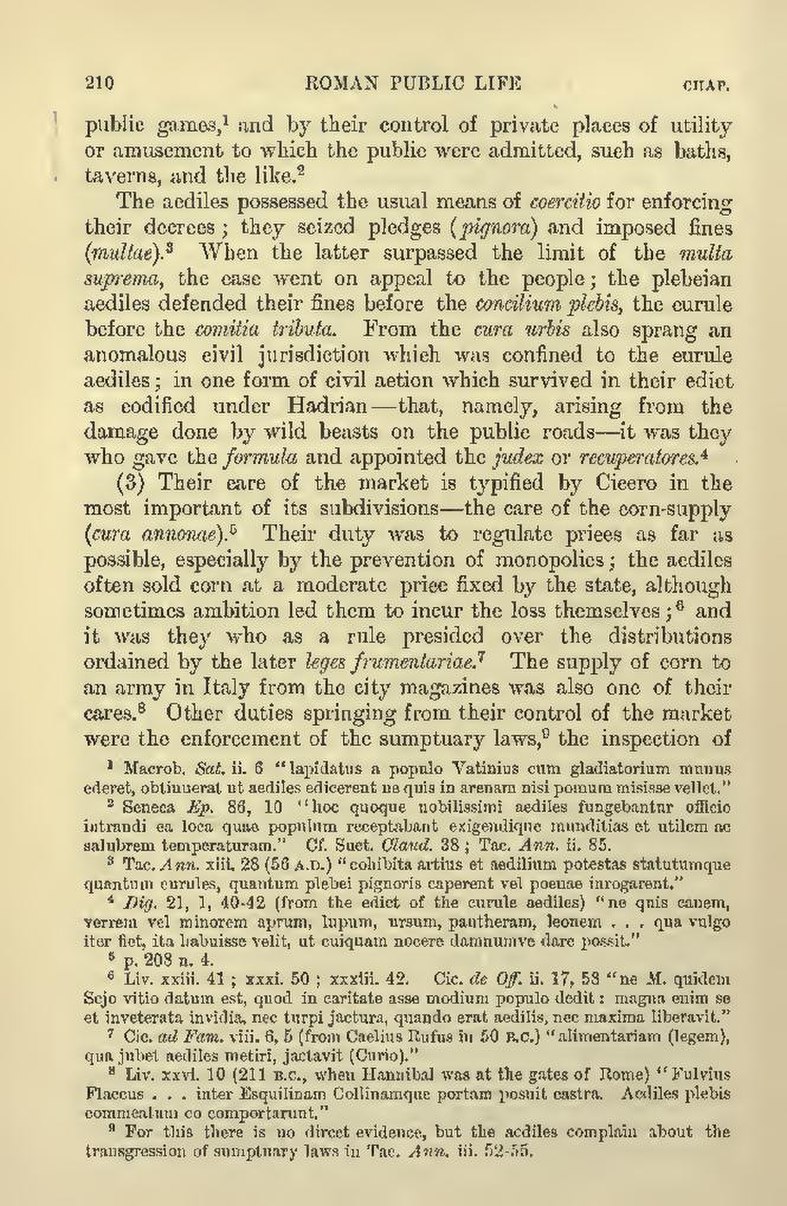public games,[1] and by their control of private places of utility or amusement to which the public were admitted, such as baths, taverns, and the like.[2]
The aediles possessed the usual means of coercitio for enforcing their decrees; they seized pledges (pignora) and imposed fines (multae).[3] When the latter surpassed the limit of the multa suprema, the case went on appeal to the people; the plebeian aediles defended their fines before the concilium plebis, the curule before the comitia tributa. From the cura urbis also sprang an anomalous civil jurisdiction which was confined to the curule aediles; in one form of civil action which survived in their edict as codified under Hadrian—that, namely, arising from the damage done by wild beasts on the public roads—it was they who gave the formula and appointed the judex or recuperatores.[4]
(3) Their care of the market is typified by Cicero in the most important of its subdivisions—the care of the corn-supply (cura annonae).[5] Their duty was to regulate prices as far as possible, especially by the prevention of monopolies; the aediles often sold corn at a moderate price fixed by the state, although sometimes ambition led them to incur the loss themselves;[6] and it was they who as a rule presided over the distributions ordained by the later leges frumentariae.[7] The supply of corn to an army in Italy from the city magazines was also one of their cares.[8] Other duties springing from their control of the market were the enforcement of the sumptuary laws,[9] the inspection of
- ↑ Macrob. Sat. ii. 6 "lapidatus a populo Vatinius cum gladiatorium munus ederet, obtinuerat ut aediles edicerent ne quis in arenam nisi pomum misisse vellet."
- ↑ Seneca Ep. 86, 10 "hoc quoque nobilissimi aediles fungebantur officio intrandi ea loca quae populum receptabant exigendique munditias et utilem ac salubrem temperaturam." Cf. Suet. Claud. 38; Tac. Ann. ii. 85.
- ↑ Tac. Ann. xiii. 28 (56 A.D.) "cohibita artius et aedilium potestas statutumque quantum curules, quantum plebei pignoris caperent vel poenae inrogarent."
- ↑ Dig. 21, 1, 40-42 (from the edict of the curule aediles) "ne quis canem, verrem vel minorem aprum, lupum, ursum, pantheram, leonem . . . qua vulgo iter fiet, ita habuisse velit, ut cuiquam nocere damnumve dare possit."
- ↑ p. 208 n. 4.
- ↑ Liv. xxiii. 41; xxxi. 50; xxxiii. 42. Cic. de Off. ii. 17, 58 "ne M. quidem Sejo vitio datum est, quod in caritate asse modium populo dedit: magna enim se et inveterata invidia, nec turpi jactura, quando erat aedilis, nec maxima liberavit."
- ↑ Cic. ad Fam. viii. 6, 5 (from Caelius Rufus in 50 B.C.) "alimentariam (legem), qua jubet aediles metiri, jactavit (Curio)."
- ↑ Liv. xxvi. 10 (211 B.C., when Hannibal was at the gates of Rome) "Fulvius Flaccus . . . inter Esquilinam Collinamque portam posuit castra. Aediles plebis commeatum eo comportarunt."
- ↑ For this there is no direct evidence, but the aediles complain about the transgression of sumptuary laws in Tac. Ann. iii. 52-55.
